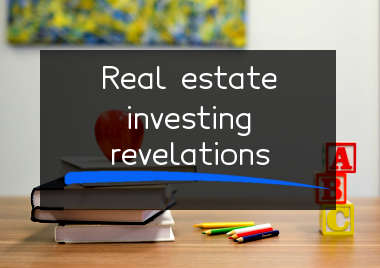Here are some commonly touted pieces of advice:
- 1. Understand your goals before getting started: A lot of people dive into real estate investing without a clear understanding of what they're trying to accomplish. Without this clarity, it's hard to determine what properties to invest in, what financing options to choose, and what exit strategy to use.
- 2. Location, location, location: This adage is crucial in real estate investing. Before investing in a property, it's important to thoroughly research its location. Factors that affect its value include the quality of schools, access to public transportation, the job market, and crime rates.
- 3. Be prepared for unexpected expenses: Real estate investing comes with a lot of unknowns. You might discover hidden damage or realize a property needs more extensive repairs than you anticipated. Make sure to have a reserve fund to cover unexpected expenses.
- 4. Build a strong team: Real estate investing is a team sport. You need professionals you can trust, such as real estate agents, brokers, appraisers, contractors, and lawyers. Once you find a good team, stick with them.
- 5. It's not just about the numbers: Real estate investing is also about emotions. People buy and sell based on their gut feelings, even if the numbers don't make sense. Be mindful of these emotional factors and how they can affect your investment decisions.
How to calculate & forecast cash flow accurately
Calculating and forecasting cash flow accurately is a critical component of financial management for any business. There are several steps involved in this process:
- 1Determine the starting cash balance: This is the amount of cash that the business currently has on hand at the beginning of the period for which you are forecasting cash flow.
- 2Estimate cash inflows: This includes all the sources of cash that will flow into the business during the forecast period. This may include revenue from sales, investments, loans, or other sources.
- 3Estimate cash outflows: This includes all the expenses that the business will have to pay during the forecast period. This may include salaries, rent, utilities, supplies, taxes, and other expenses.
- 4Subtract cash outflows from cash inflows: This will give you the net cash flow for the period. If the net cash flow is positive, then the business has more cash coming in than going out, which is a good sign. If the net cash flow is negative, then the business is spending more cash than it is taking in, which may indicate financial trouble.
- 5Use historical data and trends to forecast future cash flows: Historical data and trends can help you to predict what your cash flow will look like in the future. This may include things like seasonal changes, market trends, and other factors that could impact your cash flow.
- 6Monitor and update your forecast regularly: Cash flow forecasts are only useful if they are accurate, so it's important to monitor and update your forecast regularly to reflect changes in your business or the market.
By following these steps, you can calculate and forecast cash flow accurately, which will enable you to make informed financial decisions and manage your business effectively.
Once you buy a property, its ROI comes from excellent management
ROI (Return on Investment) is a measure of the profitability of an investment, typically expressed as a percentage. The ROI of a property is calculated by dividing the net income from the property by the total investment cost.
Excellent management is crucial to maximizing the ROI of a property investment. Effective management can help optimize the value of the property by keeping it well-maintained, attracting and retaining high-quality tenants, and minimizing vacancy rates. A skilled property manager can also negotiate favorable lease terms, maintain accurate financial records, and implement strategies to minimize operating expenses, such as energy-efficient upgrades or bulk purchasing agreements.
By maximizing the income generated by the property and minimizing the costs associated with owning and operating it, excellent management can help increase the net income from the property and ultimately improve the ROI.
House hacking is a great way to get started
Here are the reasons why house hacking is considered a great way to get started:
- 1Affordable living: House hacking allows you to live in your property while renting out a portion of it to tenants. This helps you cover your mortgage payments, maintenance costs, and other expenses associated with the property.
- 2Steady rental income: House hacking ensures that you have a steady stream of rental income, which can help pay off your mortgage and other monthly expenses.
- 3Access to better properties: With house hacking, you can purchase a property that you might not be able to afford otherwise. You can use your tenants rent to cover the mortgage and still have the benefit of owning a more expensive and desirable property.
- 4Tax benefits: House hacking offers tax benefits where you can deduct expenses related to the rental property, such as mortgage interest, property taxes, and maintenance costs.
- 5Learning experience: House hacking can provide an excellent learning opportunity for future real estate endeavors. You will learn about property management, finding tenants, and handling maintenance issues, which can be beneficial for your future investments.
Overall, house hacking can be a great way to get started in real estate investing because it can help you to save money and build wealth over time.
You don't need the "perfect deal" to start investing; you need a good deal
You don't need a "perfect" deal to start investing because there is no such thing as a perfect deal. Every investment comes with some degree of risk, and it's impossible to identify a deal that is completely risk-free. Therefore, waiting for the perfect deal can lead to missed opportunities and delay your investment journey. Instead, you only need a good deal to start investing. A good deal is one that you have thoroughly researched, and the potential benefits outweigh the risks. With a good deal, you can start investing and gain valuable experience that will help you make more informed investment decisions in the future. Over time, as you gain more experience and knowledge, you can refine your investment strategies and identify better opportunities. The key is to start somewhere and not let the fear of making a mistake hold you back from investing.
Focust on the fundamentals, and set the rest aside for later
Focusing on the fundamentals is crucial in achieving success in any field or discipline. The fundamentals are the basic building blocks that form the foundation of any skill or concept. Without a strong foundation of fundamentals, it becomes difficult to progress to more advanced levels or to adapt to changes in the field. Moreover, revisiting and reinforcing the fundamentals helps to identify and correct any gaps in knowledge or skill which may be limiting progress. It is also beneficial in achieving mastery of the subject and allows for more creativity and innovation in applying these core principles. Therefore, by focusing on the fundamentals, individuals can ensure a strong foundation and continued success in their chosen field.
Just one more thing: if you liked the article, please like us on social media and share this article with friends.



